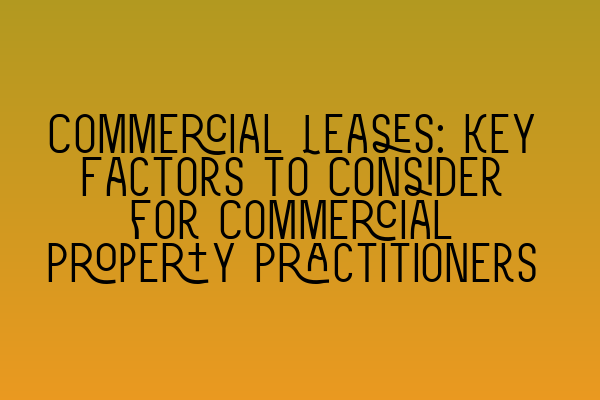Commercial Leases: Key Factors to Consider for Commercial Property Practitioners
Commercial leases are an essential aspect of commercial property transactions, and understanding the key factors involved is crucial for commercial property practitioners. Whether you are a solicitor, property lawyer, or a commercial property expert, it is important to stay updated and well-informed about the intricacies of commercial leases. In this blog post, we will discuss some of the key factors that you should consider when dealing with commercial leases.
1. Lease Terms and Rent Review
The lease terms are the foundation of any commercial lease agreement. It is important to carefully review and negotiate the terms to ensure that they align with the client’s objectives and requirements. This includes the duration of the lease, break clauses, repair obligations, and rent review provisions. Understanding the rent review mechanisms is particularly important, as it can significantly impact the rental income for both landlords and tenants.
2. Use Class and Permitted Use
The use class and permitted use provisions are essential in commercial leases. They define the activities that are allowed to take place on the premises. It is important to ensure that the use class is accurately defined and aligns with the client’s intended use for the property. Additionally, considering any potential future changes in the use class can help safeguard the client’s interests.
3. Alienation and Assignment
Commercial leases often contain provisions relating to alienation and assignment, which allow tenants to transfer their interests to a third party. It is important to consider the limitations and conditions placed on assignments and subletting, as they can impact the client’s ability to effectively manage the property and maintain control over the tenant mix.
4. Repair and Maintenance Obligations
The repair and maintenance obligations are crucial aspects of any commercial lease. Understanding the extent of these obligations is essential for both landlords and tenants. It is important to carefully review and negotiate the repair clauses to ensure that they are fair and reasonable. Additionally, considering the impact of any planned or anticipated structural changes on the repairing obligations is crucial.
5. Rent and Service Charge
The rent and service charge provisions are essential in commercial leases. It is important to carefully review the rent payment terms and ensure that they are clear and unambiguous. Additionally, considering the service charge provisions and any potential future increases is crucial to manage the financial implications for the tenant.
6. Termination and Dilapidations
The termination provisions and dilapidations are important considerations when dealing with commercial leases. Understanding the conditions for termination and the potential liabilities for dilapidations is crucial for both landlords and tenants. It is important to consider the potential costs involved and negotiate the terms accordingly.
7. Renewal and Lease Extensions
The renewal and lease extension provisions are essential aspects of commercial leases. Understanding the procedures and timelines involved in renewing or extending a lease is crucial, as it can affect the client’s future occupancy and financial commitments. Considering any potential rent increases and break clauses during the renewal or extension process is also important.
In conclusion, commercial leases are complex legal documents that require careful consideration of various key factors. When dealing with commercial leases, it is essential for commercial property practitioners to have a comprehensive understanding of the lease terms, use class, alienation, repair obligations, rent and service charge, termination, and renewal provisions. By staying updated and well-informed about these factors, commercial property practitioners can effectively advise their clients and navigate the intricacies of commercial lease agreements.
To further enhance your knowledge and preparation for SQE exams, we recommend checking out our related articles:
– SQE 1 Practice Exam Questions
– SQE 1 Practice Mocks FLK1 FLK2
– SQE 2 Preparation Courses
– SQE 1 Preparation Courses
– SRA SQE Exam Dates
Stay tuned for more informative content on property law and land law.
